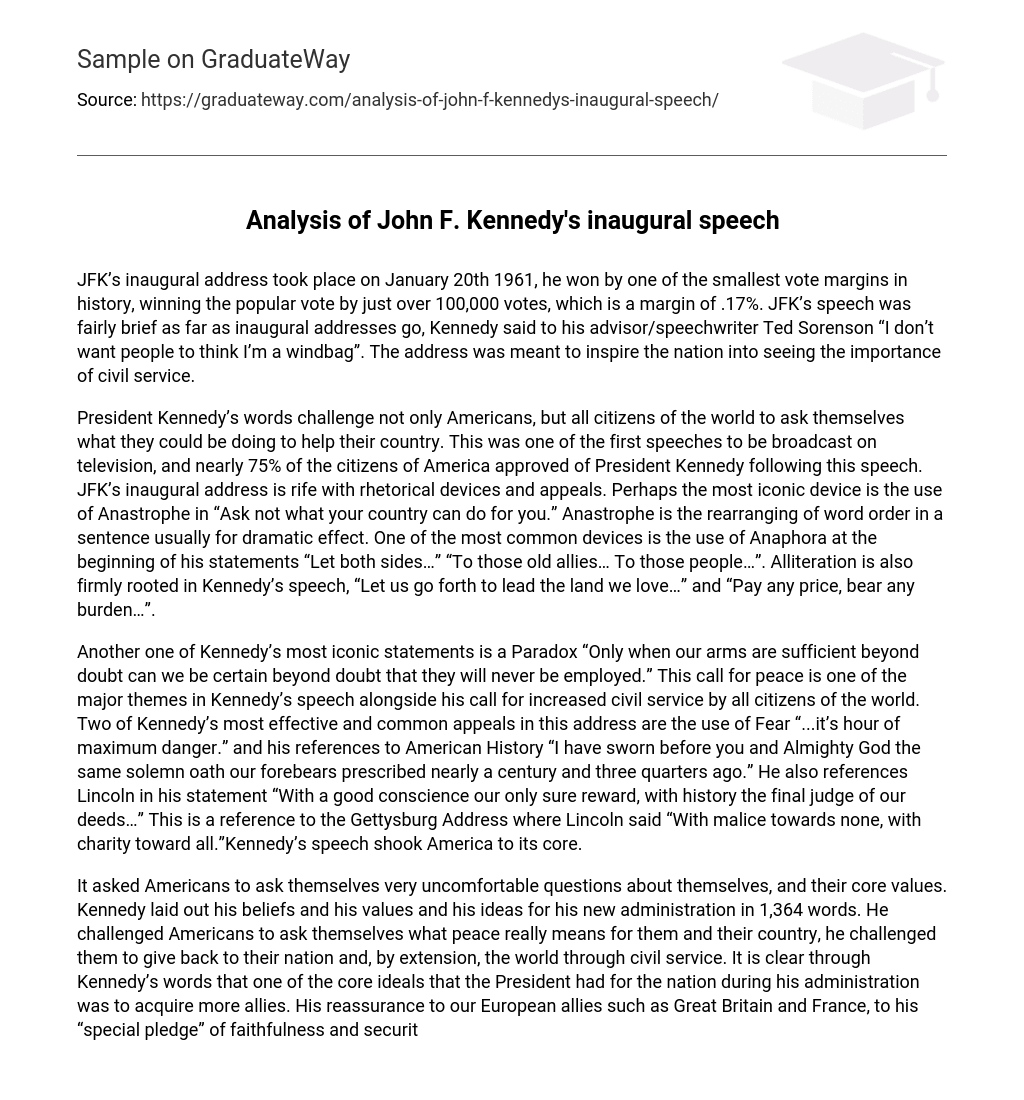JFK’s inaugural address took place on January 20th 1961, he won by one of the smallest vote margins in history, winning the popular vote by just over 100,000 votes, which is a margin of .17%. JFK’s speech was fairly brief as far as inaugural addresses go, Kennedy said to his advisor/speechwriter Ted Sorenson “I don’t want people to think I’m a windbag”. The address was meant to inspire the nation into seeing the importance of civil service.
President Kennedy’s words challenge not only Americans, but all citizens of the world to ask themselves what they could be doing to help their country. This was one of the first speeches to be broadcast on television, and nearly 75% of the citizens of America approved of President Kennedy following this speech. JFK’s inaugural address is rife with rhetorical devices and appeals. Perhaps the most iconic device is the use of Anastrophe in “Ask not what your country can do for you.” Anastrophe is the rearranging of word order in a sentence usually for dramatic effect. One of the most common devices is the use of Anaphora at the beginning of his statements “Let both sides…” “To those old allies… To those people…”. Alliteration is also firmly rooted in Kennedy’s speech, “Let us go forth to lead the land we love…” and “Pay any price, bear any burden…”.
Another one of Kennedy’s most iconic statements is a Paradox “Only when our arms are sufficient beyond doubt can we be certain beyond doubt that they will never be employed.” This call for peace is one of the major themes in Kennedy’s speech alongside his call for increased civil service by all citizens of the world. Two of Kennedy’s most effective and common appeals in this address are the use of Fear “…it’s hour of maximum danger.” and his references to American History “I have sworn before you and Almighty God the same solemn oath our forebears prescribed nearly a century and three quarters ago.” He also references Lincoln in his statement “With a good conscience our only sure reward, with history the final judge of our deeds…” This is a reference to the Gettysburg Address where Lincoln said “With malice towards none, with charity toward all.”Kennedy’s speech shook America to its core.
It asked Americans to ask themselves very uncomfortable questions about themselves, and their core values. Kennedy laid out his beliefs and his values and his ideas for his new administration in 1,364 words. He challenged Americans to ask themselves what peace really means for them and their country, he challenged them to give back to their nation and, by extension, the world through civil service. It is clear through Kennedy’s words that one of the core ideals that the President had for the nation during his administration was to acquire more allies. His reassurance to our European allies such as Great Britain and France, to his “special pledge” of faithfulness and security to our friends in Central and South America.
He also signaled that he wanted an end to the Cold War, his indirect words to Nikita Khrushchev the Soviet chairman, said that he wanted to negotiate peace, rather than continue for the world to live in fear of total annihilation. One of JFK’s major points of this speech was to show not only American citizens, but other world leaders, that he was ready to convey his seriousness and his grasp of national and global issues. He wanted to show the world that he could lead a major nation at just 43 years old.
Perhaps the reason that the speech is so influential does not lie in the words themselves or even the meaning of the words. The reason that the speech is so well known and important to not only Americans, but all the people of the world, is that it is one of the first major speeches by an American president to be broadcast on both television and radio. This allowed everyone in the nation with a TV to watch the president give a very rousing speech. If the television had not been a factor here, perhaps the speech would have fallen into obscurity like many other presidential addresses.





